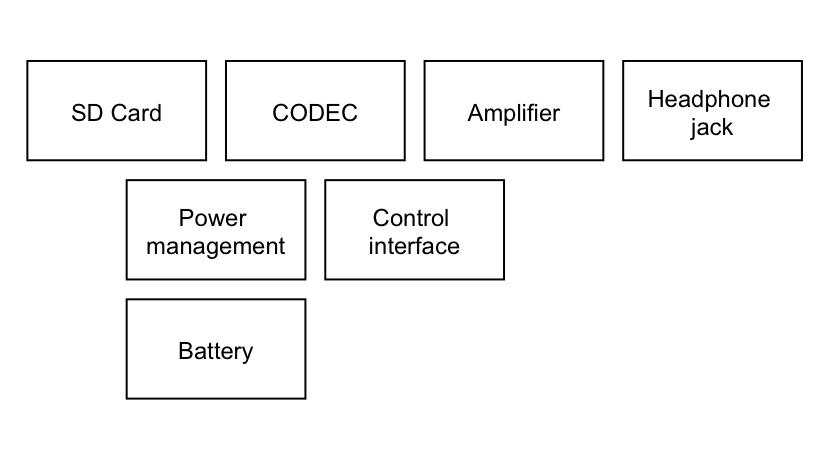jpod is a project to create a replacement for my old iPod. It’s something I’ve considered building for years, but now seems like an ideal project to put the ideas in Computational Independence to the test.
A block diagram of the hardware might look something like this:

I’ve already found examples that will serve as a starting point for synthesizing most of these components, and for the most part they can be implemented in hardware. The only part that I’m not sure about is interacting with the file system on the SD card (list the files, read metadata, etc.) and providing an interface for the user to control playback.
For this it may be necessary to write some software, and if we need software, we need something to run it on. There’s no shortage of examples of “ softcore ” CPU’s capable of running the kind of software needed for this application, but we are limited by the size of the FPGA. In this case I want to try and make the entire player fit into a upduino device, so simpler is better.
Another constraint is how we want to write the software. The simplest thing to run would be some sort of assembly language, but this is also probably the hardest thing to work with from the programmers perspective. If I want to make something someone else might possibly program, I need to at least consider how this choice limits the programmer audience. Going up one step to a language like C isn’t much more difficult on the hardware side, but it doesn’t broaden the programmer audience much more than a single order of magnitude (at best). It also adds the need for a compiler, which is not a trivial thing to build, and using an existing one means constraining the CPU design, so this path starts to pile-on complexity without providing a lot of benefit to the programmer.
At the other end of the spectrum are interpreted languages like Python, which at first might seem like ambitious targets for a simple hardware design, but there is a version called MicroPython that targets microcontrollers which are similarly resource-constrained. Could we cram a core capable of running MicroPython into this project?
I started looking into the porting process and it looks like I’d still need to find a way to compile C code for the target machine, but if this is a task for the firmware developer (as opposed to someone interested in programming the finished device) having a polished toolchain is less important. The real question is how much hardware is needed to provide the resources to run the minimal port, and will this port provide enough functionality to write the user interface? A second question is, will it run fast enough?
Clearly I have a lot more research to do, but so far I haven’t ruled out the possibility of using MicroPython as the programming environment for jpod. If this is possible it goes a long way toward the goal of designing a device along the CI principals.
